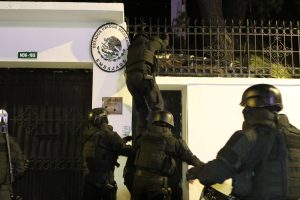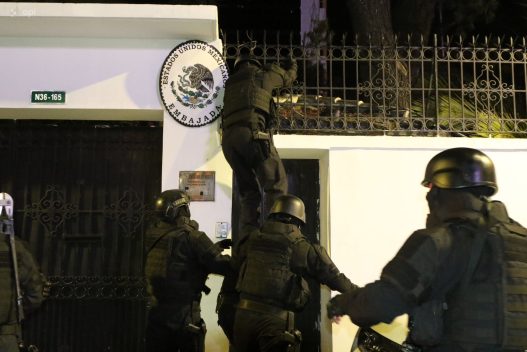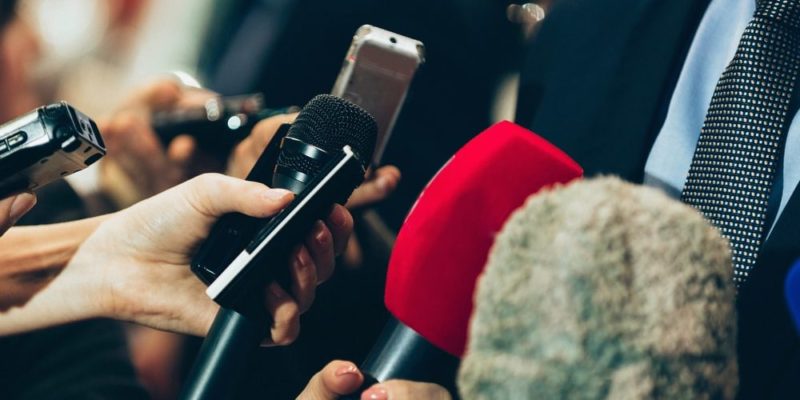
MEXICO TO DENOUNCE ECUADOR BEFORE THE INTERNATIONAL COURT OF JUSTICE
The government of Mexico announced that it will go to the International Court of Justice to denounce what it has described as violations of International Law by Ecuador. This was announced by Mexican Foreign Minister Alicia Bárcena.
This decision, said Bárcena, responds to violations to the principle of inviolability of the premises and of the Mexican diplomatic personnel established in Ecuador. The Mexican Foreign Ministry has indicated that the recent actions of the Ecuadorian State contravene the fundamental norms of international coexistence.
On Friday night, April 5, Ecuadorian police officers forced their way into the Mexican embassy in Quito, where the former vice-president of Ecuador, Jorge Glas, was already staying as an asylum seeker. He had been granted asylum on the morning of that same Friday. Glas considered himself a politically persecuted person.
GLAS’ JUDICIAL DEBTS
The former vice-president has outstanding accounts with the Ecuadorian justice. As recalled by the Ecuadorian media Primicias, Glas was sentenced on December 13, 2017 to six years in prison for illicit association for the Odebrecht case, and to eight years for bribery in the case called Bribes. “Both sentences were unified, so Glas was to remain in prison for eight years,” explains the media.
In December 2022 he was released from prison thanks to a provisional precautionary measure, granted by a judge who is now being prosecuted by the Prosecutor’s Office on suspicion of receiving payments to favor sentences. This measure was supposed to benefit him until the completion of his pre-release process, a legal benefit that allows him to finish serving his sentence outside of prison. But, in December 2023, the justice denied him this resource. Therefore, Glas had to return to prison since he has only served five years and two months in prison.
In addition, in January 2024, Glas was prosecuted for embezzlement in the case of Reconstruction of Manabí. A judge ordered preventive detention, which could not be executed because the former vice-president was already taking refuge in the Mexican embassy in Quito.
His name also appears in the prosecution of two new cases, the so-called Metastasis and Purga, in which Glas is pointed out by the Prosecutor’s Office for his alleged links with those involved in a structure of public officials and justice operators that has favored drug trafficking and corruption.
Glas had been in the Mexican embassy since the end of December 2023. There he was a refugee while processing his request for political asylum.
THE BEGINNING OF THE DIPLOMATIC CRISIS
The events were precipitated by statements made by the President of Mexico, Andres Manuel Lopez Obrador, who on Wednesday, April 3, insinuated that the murder of the Ecuadorian presidential candidate Fernando Villavicencio, in August last year, had caused the candidate of Revolucion Ciudadana to be relegated in the electoral race, since that party (which is akin to AMLO’s political vision) was Villavicencio’s fierce rival.
AMLO said on Wednesday in his usual press conference: “The candidate of the progressive force was about 10 points ahead (…). Then, a candidate who speaks ill of the candidate who is ahead, suddenly, is assassinated, and the candidate who was ahead falls and the candidate who was second goes up”.
In the end, the election was won by the current president of Ecuador, Daniel Noboa.
PERSONA NON GRATA
These statements were rejected by the Ecuadorian government, which invoked the principle of non-intervention in the internal affairs of other states.
AMLO’s declarations were also made in a context in which Ecuador is preparing to go to the polls to decide on a popular consultation called by Noboa’s government.
Villavicencio’s family also complained about the statements of the Mexican president. Amanda Villavicencio, daughter of the murdered candidate, sent a tweet to AMLO in which she said: “Fernando Villavicencio was murdered by the gangsters that he always investigated. Some of them in asylum in your embassies and in your country”.
Then, on Thursday, April 4, the government of Ecuador decided to declare the Mexican ambassador, Raquel Serur, persona non grata, who had to leave the country.
THE ASYLUM
Mexico’s response was to grant on Friday morning, April 5, the political asylum Glas had requested. The Mexican Foreign Ministry announced that it would ask the Ecuadorian authorities for the safe-conduct required for Glas to leave the embassy without being detained.
On Friday afternoon, Quito informed that it would not grant such safe-conduct as it considered that Glas, with two sentences against him and an open criminal process, had to answer to justice and that the asylum granted became a mechanism of impunity. “It is not lawful to grant asylum to persons convicted or prosecuted for common crimes and by ordinary competent courts,” Noboa’s government justified.
THE CAPTURE
What nobody expected was that things would escalate to the level of what happened on Friday night, when Ecuadorian police broke into the Mexican embassy, armored cars included, and captured Glas, who was taken to the facilities of the Attorney General’s Office for the corresponding prosecution.
The surveillance outside the embassy had been redoubled after the granting of asylum and a possible departure of Glas, to leave the embassy and, probably, the country.
Diplomat Roberto Canseco, who remained in charge of the delegation after Serur’s departure, denounced what he considered an outrage. “Like criminals they raided the Mexican embassy in Ecuador. This is not possible, it cannot be, it is crazy (…) there is no basis for doing this”, said a visibly affected Canseco.
When two armored cars of the Ecuadorian police left the embassy, Canseco ran after them to prevent them from taking Glas away. Police officers prevented him from approaching the vehicles.
The Ecuadorian government justified its actions by stating in an official communiqué that “no criminal can be considered a political persecuted person”. It also said that it proceeded to the capture “due to the abuse of immunities and privileges granted to the diplomatic mission hosting Jorge Glas, and to know a diplomatic asylum contrary to the conventional legal framework”.
SUSPENSION OF RELATIONS
The Mexican response, announced by President López Obrador, was the decision to suspend diplomatic relations with Ecuador.
“This is a flagrant violation of international law and Mexico’s sovereignty, for which I have instructed our foreign minister to issue a statement on this authoritarian act, proceed legally and immediately declare the suspension of diplomatic relations with the government of Ecuador,” reads AMLO’s statement.
Foreign Minister Bárcena specified that this was a “flagrant violation of the Vienna Convention on Diplomatic Relations”.
Mexico also announced the immediate departure of diplomatic personnel from its embassy in Ecuador. “Mexico expects Ecuador to offer the necessary guarantees for the departure of Mexican personnel,” she said.
Bárcena assured that Mexico will resort to the International Court of Justice to denounce Ecuador’s responsibility for violations to International Law.
REACTIONS
The former president of Ecuador, Rafael Correa, also sentenced in the bribery case, and of whom Glas was his minister and vice-president, said that “not even in the worst dictatorships has a country’s embassy been violated”.
The mayor of Quito, Pabel Muñoz, of the same political party as Correa and Glas, described as “unacceptable” and “a worldwide shame” what happened in the Mexican Embassy.
He assured that the act will generate a complex situation of Ecuador before the system and international law. “Is there any doubt that Jorge Glas is the victim of a terrible persecution? The fact is even more serious given that he has already been granted political asylum,” he added.
Even former presidential candidate Christian Zurita, who replaced Villavicencio after his assassination, considered that “At this time the world sees us as the worst”.
Noboa’s decision, on the other hand, had the support of the assembly members of his party, such as Valentina Centeno, who said that “Ecuador is a sovereign country. We will not allow any criminal to go unpunished”.
In Mexico, there was a political consensus supporting López Obrador’s decision.
Opposition presidential candidate Xóchitl Gálvez said that “One may or may not agree with the administration of justice in other countries, but the diplomatic headquarters of any foreign nation are inviolable”.
Official candidate Claudia Sheinbaum considered that “The break-in at the Mexican Embassy is a flagrant violation of the Vienna Convention. This affront to diplomacy and international law is inadmissible. I express my full solidarity and support to President López Obrador in the defense of our sovereignty”.
PRI leader, Alejandro Moreno, condemned the Government of Daniel Noboa. “It is a disastrous precedent for international relations, the Ecuadorian Government trampled on the inviolability established in the Vienna Convention”, he said.
————
This text is of free use. If you use it, please cite EditoRed.



